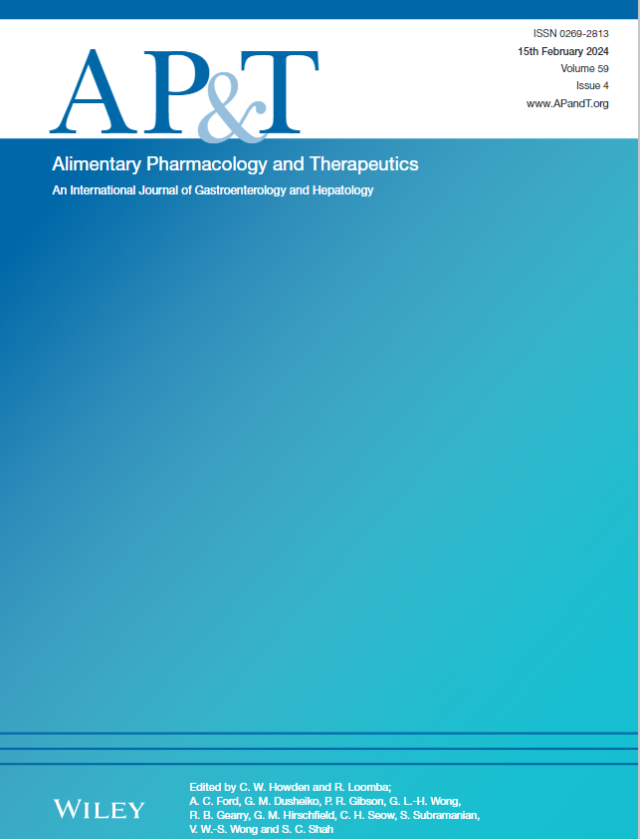Prescribing Inflammatory Bowel Disease Medications in Chronic Kidney Disease: A Practical Guide
IF 6.6
1区 医学
Q1 GASTROENTEROLOGY & HEPATOLOGY
引用次数: 0
Abstract
BackgroundThe prevalence of chronic kidney disease (CKD) in patients with inflammatory bowel disease (IBD) is increasing. The pharmacokinetic profiles of IBD medications in patients with advanced‐stage CKD are not well studied.AimTo provide evidence‐based guidance on the use of medical therapies in patients with IBD and CKD.MethodsWe conducted a narrative review of literature up to 31 March 2025 on studies of therapies currently used for the treatment of IBD in the setting of CKD, with a focus on advanced kidney disease and use in renal replacement therapy.ResultsMesalazine can cause acute interstitial nephritis. Calcineurin inhibitors have been associated with nephrotoxicity. Methotrexate is contraindicated in advanced renal disease, including while on renal replacement therapy, due to higher risks of toxicity and myelosuppression. Dose adjustment of thiopurines should be considered in advanced renal disease due to metabolite accumulation. Monoclonal antibodies, including anti‐tumour necrosis factor therapy, anti‐integrin therapy and anti‐interleukin 12/23 therapies, appear to be safe in renal insufficiency, including haemodialysis. There is limited data available for small molecule therapies; drug metabolism profiles suggest they are safe in CKD, although, for Janus kinase (JAK) inhibitors, including tofacitinib and upadacitinib, dose reduction should be considered in advanced renal disease.ConclusionMost therapies used in IBD, particularly biologic therapies, appear safe and effective when used in patients with CKD, including those on renal replacement therapy. Caution should be considered when using conventional therapies and JAK inhibitors.慢性肾脏疾病的炎症性肠病药物处方:实用指南
背景:慢性肾脏疾病(CKD)在炎症性肠病(IBD)患者中的患病率正在上升。晚期CKD患者中IBD药物的药代动力学特征尚未得到很好的研究。目的为IBD和CKD患者的药物治疗提供循证指导。方法:我们对截至2025年3月31日的文献进行了叙述性回顾,回顾了目前用于治疗慢性肾病的IBD治疗方法的研究,重点是晚期肾脏疾病和肾脏替代治疗的应用。结果萨拉嗪可引起急性间质性肾炎。钙调磷酸酶抑制剂与肾毒性有关。甲氨蝶呤是晚期肾脏疾病的禁忌症,包括在肾脏替代治疗中,由于较高的毒性和骨髓抑制风险。由于代谢物积累导致的晚期肾脏疾病应考虑调整硫嘌呤的剂量。单克隆抗体,包括抗肿瘤坏死因子治疗、抗整合素治疗和抗白细胞介素12/23治疗,似乎对肾功能不全(包括血液透析)是安全的。小分子疗法的可用数据有限;药物代谢谱表明它们在CKD中是安全的,尽管对于Janus激酶(JAK)抑制剂,包括托法替尼和upadacitinib,在晚期肾脏疾病中应考虑减少剂量。结论大多数用于IBD的治疗方法,特别是生物治疗,在CKD患者中使用时是安全有效的,包括那些使用肾脏替代治疗的患者。在使用常规疗法和JAK抑制剂时应谨慎考虑。
本文章由计算机程序翻译,如有差异,请以英文原文为准。
求助全文
约1分钟内获得全文
求助全文
来源期刊
CiteScore
15.60
自引率
7.90%
发文量
527
审稿时长
3-6 weeks
期刊介绍:
Alimentary Pharmacology & Therapeutics is a global pharmacology journal focused on the impact of drugs on the human gastrointestinal and hepato-biliary systems. It covers a diverse range of topics, often with immediate clinical relevance to its readership.

 求助内容:
求助内容: 应助结果提醒方式:
应助结果提醒方式:


